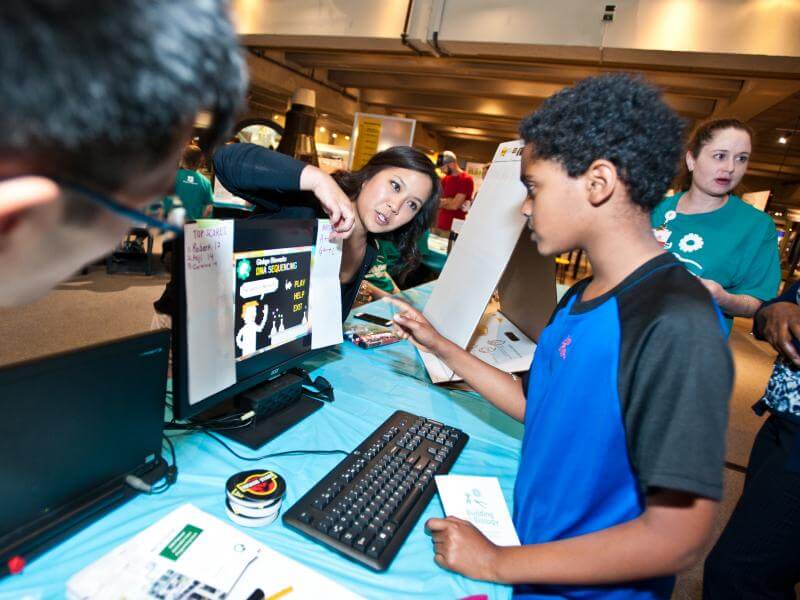Rae Ostman, Arizona State University; Ira Bennett, Arizona State University; Stephanie Long, Science Museum of Minnesota; David Sittenfeld, Museum of Science; Jameson Wetmore, Arizona State University
Posted: July 21, 2017

This presentation will share STS approaches to engaging public audiences and scientists in conversations about emerging technologies, focusing on several related projects that consider synthetic biology. These projects share a common, overarching objective to change the way we as a society think, learn, and talk about science and technology.
The Frankenstein Bicentennial Project is developing a suite of transmedia learning experiences that explore synthetic biology and other technologies, including an alternate reality game, creative making activities, and online challenges. The project is studying learning in a transmedia environment and investigating the way different experiences contribute to learners’ sense of self-efficacy related to STS ideas. Over 50 organizations will organize events in January, 2018 to coincide the 200th anniversary of the publication of Mary Shelley’s novel Frankenstein, which will feature these transmedia experiences. The Frankenstein transmedia project is funded by NSF.
Storming the Castle is an interactive museum theatre program that considers the possible promises and perils of synthetic biology. This comedy uses the Frankenstein story to raise questions about responsible innovation. Project evaluation considered how museum theatre encourages learning and complements other types of experiences typically offered by science museums. Storming the Castle is funded by IMLS. Building with Biology brings scientists and public audiences together in conversations and hands-on activities about synthetic biology and the ways it is interconnected with society.
Building with Biology resource kits were distributed and used by 200 science museums and universities in events held in 2016. Building with Biology forum programs, Should We Engineer the Mosquito? and Should We Edit the Genome?, were held at around 40 locations. Project evaluation examines the impact of these experiences on both public and scientist participants. Building with Biology is funded by NSF.
These projects are part of a longstanding collaboration among faculty at the School for the Future of Innovation in Society (SFIS) at Arizona State University and staff at science museums that are part of the National Informal STEM Education Network (NISE Net). The mission of SFIS is to cultivate and extend the ideas that: 1) Innovation is a complex process in which social and technical actions and considerations continually interact to create similarly complex, real-world outcomes; 2) The usefulness and even the validity of knowledge relevant to human problem-solving reflect social context and may arise from multiple sources and perspectives; and 3) The processes of creating knowledge and building more desirable futures need to be more interdisciplinary, more anticipatory, and more democratic. NISE Net is a community of informal educators and scientists dedicated to supporting learning about science, technology, engineering, and math (STEM) across the United States. The Network achieves its reach and impact through the participation of around 600 partner organizations in Network projects and activities.
The presentation at 4S will include: hands-on and forum activities from Building with Biology; making activities and the alternate reality game from Frankenstein; and a videotaped version of Storming the Castle. The presenters will also share research and evaluation findings related to public learning of STS ideas.
Making and Doing
Toronto 2021
Inventive AI
Justice
Multispecies
Performance
Storytelling as Relations
Virtual Prague 2020
Disasters, Breakdowns, Precarity,
Slow Violence
Experiments in Collaboration and
Critical Participation
Medicine, Health, Disability Studies
Climate Change, Anthropocene,
Geosciences
Multispecies Assemblages, Life
Sciences, Queer Ecologies
Politics, Governmentality, Participation
and Protest
Big Data, Information Sciences,
Technosphere
Worlds Otherwise
Religion, Spirits, Animism Speculative
Apparatuses, Sensing Practices
New Orleans 2019
Imagining
Living with
Playing / Crafting
Experiencing / Listening
Mapping / Monitoring
Conversing
Sydney 2018
Situated Knowledges
Infrastructure and co-design
Knowing and governing
Issues, people and publics
Performance and effect
Methods and practices
Boston 2017
Open
STS Infrastructures
Pedagogy
Visual and Sensory Approaches
Design and Planning
Policy
Denver 2015
STS Infrastructures
Visual and Sensory Approaches
Pedagogy
Open
Design and Planning
Policy
Lists and Groups
Professional Associations
Movies
Giving birth as a struggle between bodily needs and medical practice
Crafting Medicine: A Sensory Exploration of Three Medical Schools
Embroidering the Times of Listening: Testimonial Digital Textiles for Reconciliation in Colombia
Exploring Ethical Decision Making in Video Games
Robocops, flowers and stones: technologies and arts of repression, resistance and protest
